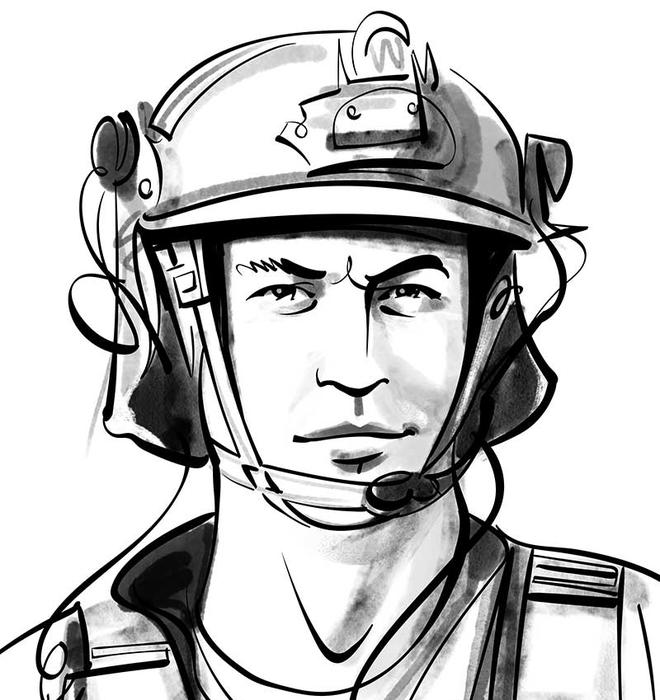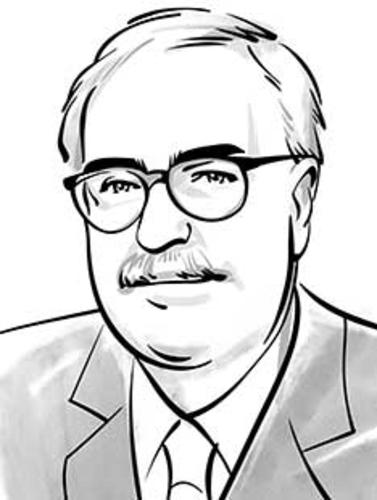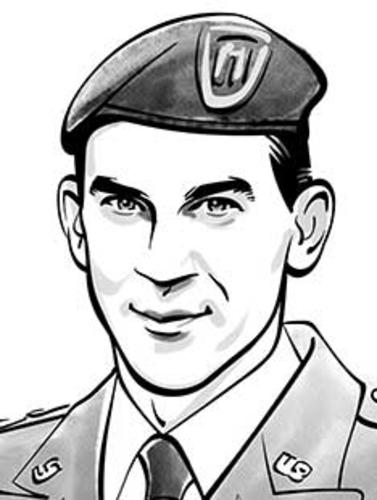
Four years ago, Mykola Petrenko ’13 was in northern Afghanistan helping Afghan commandos hunt down Taliban leaders. As an Army intelligence officer, Petrenko sifted through data to identify the locations of key insurgents so they could be captured by Afghan soldiers or killed by drone strikes. Fifteen years had passed since 9/11 — Petrenko was 9 years old on the day of the attacks — and the United States still hadn’t quashed the insurgency.
According to America’s prevailing narrative, the Afghan people hated the Taliban, the repressive Islamist political movement that took control of the country in the 1990s. Many Afghans were indeed jubilant to have been liberated back in 2001, and policymakers assumed the Afghan population largely supported the new U.S.-backed government.
But what Petrenko saw on the ground suggested that narrative was no longer clear-cut. One day, several thousand Afghans gathered nearby for the funeral of a Taliban leader. “We’d been looking for this dude for years,” Petrenko says. “Clearly everybody knew where he was. They just didn’t want to tell the Americans.”
The U.S. had long touted the strength of the Afghan military, a critical prerequisite to a U.S. and NATO exit. But Petrenko wasn’t so sure. The Afghan commandos he worked with were “the best-trained Afghan units,” Petrenko says, before pausing to correct himself: “At least, quote, ‘best trained.’” He says he would take a platoon of regular American soldiers over these elite forces “in a heartbeat.”
Petrenko recorded his prognosis in a journal entry dated March 2, 2017:
“This evening we had a long conversation with [the team warrant officer] about the state of affairs in Afghanistan … . I was surprised to hear the concession that Afghanistan was never going to be won. Ultimately, as soon as the U.S. leaves …, we all acknowledged that this country was going to descend into chaos [and] the Taliban would take over.”
That’s precisely what happened this summer.
The United States invested 20 years in Afghanistan. Over $2 trillion was spent on the war and reconstruction. More than 2,300 U.S. troops were killed — with thousands more severely injured or committing suicide once they returned home.
In April, President Joe Biden announced he would stand by an agreement the Trump administration had made with the Taliban to leave this year. In July, the U.S. pulled out of Bagram Airfield, long the centerpiece of American military operations. Both the Afghan forces and the Taliban read that as a pivotal sign. With little opposition, the Taliban started toppling provinces and eventually sailed into the capital Aug. 15. Two weeks later, after the tumultuous evacuation at Kabul’s airport, a C-17 transport plane carried out the last U.S. troops. After 20 years, the U.S. war was over. The Taliban were back in charge.
The Princeton Alumni Weekly reached out to nearly 20 alumni who’d worked or served in Afghanistan in different capacities over the last two decades — not generals or policymakers, but people who experienced the war as soldiers, diplomats, or researchers. Not one was surprised by the collapse of the government. All had observed deep flaws in their part of the enterprise. Most wondered how it had been allowed to continue for so long.
The chaos of the evacuation underscored for many a belief that the U.S. leadership was never able to get its arms around Afghanistan. Few thought there was any point in staying. Still, the total loss of the country was a bitter pill for many. One alumnus, who spoke anonymously because he is still on active duty and didn’t have permission to speak to the media, says he worries about a new wave of suicides among veterans. “We’re asked to carry out some very violent acts on behalf of our country,” he says. A soldier can come to terms with that if they believe there’s a larger purpose at work. “And now their purpose is gone.”
Robert Finn *78 was tapped in the winter of 2001 to be the first U.S. ambassador in Kabul since the Soviet invasion more than two decades earlier. He was teaching at Princeton, on sabbatical from the State Department, when he got the call. “I had a reputation as someone who’d do well in those kinds of conditions,” he says. He had opened the first embassy in Azerbaijan after the collapse of the Soviet Union and had weathered violent protests outside the embassy in Pakistan.
Finn arrived in Kabul on St. Patrick’s Day in 2002 and moved into the old U.S. embassy building along with several hundred staffers. By then, Osama bin Laden’s al-Qaida and the Taliban had fled to safe zones in Pakistan. Finn had everything he needed except one: “I didn’t have marching orders.”
The Bush administration understood the entire country would have to be rebuilt from scratch. After years of civil war, there was little in the way of a functioning government, military, police, courts, education system, or economy. Washington wanted to get Afghanistan stable enough so it would never again serve as a launching pad for terrorism. In April 2002, President George W. Bush declared that a Marshall Plan-style effort would be needed. Behind the scenes, however, Finn saw little interest in doing the actual work.
“Washington was always saying, ‘We’re not doing nation-building,’” Finn says. His own experience told him otherwise. “I said to myself, ‘Yes, you are, because you’re not going to be able to leave unless those things are there.’” Many years later, he would tell a Pentagon research group, “Everybody was talking about [the mission lasting] a year or two, and I said to them, we would be lucky if we were out of here in 20 years.”
Meanwhile, Washington was starting to refocus its attention on Iraq, shifting military and diplomatic resources away from Afghanistan. “It was sort of like watching a tsunami forming in the distance,” Finn says. “I was hoping it wouldn’t happen.” Finn says there had been a period of calm in those first few years when American efforts could have given the country a running start while the Afghan people were still optimistic. Instead, the U.S. decision to chase a new goal unintentionally sent a message that would have implications for years to come. “The Afghans learned they were not important,” Finn says, “that we were not going to be there for them.”
Liam Collins *10 was one of the first Special Forces soldiers to drop into Afghanistan in the first weeks of the war. He teamed up with local militias to go after al-Qaida and the Taliban — a task especially suited to Green Berets, who are trained in irregular warfare. By 2002, conventional U.S. forces — those trained to fight high-tech land and sea battles against other nation-states — began arriving. “Everybody was afraid the war would be over,” Collins says. “They wanted to get into the fight.”
One day, an officer from a conventional brigade told Collins about a major operation in the works and showed him a list of potential targets they planned to raid. But when Collins looked at the imagery, he recognized one target as a school under construction. “You probably don’t want to hit that,” Collins told the man. Instead, he gave the officer a handful of leads he’d collected on suspected bomb-makers.
The next day, however, the officer told Collins the brigade was sticking to its original plan. It had taken the school off its list but wasn’t going to act on Collins’ leads. It was too late to make additional changes, he explained. Conventional army brigades needed long lead times to plan operations because they rely on processes designed for larger, traditional battles. They weren’t used to the nimbler operations required in insurgencies, Collins says, noting, “I was in shock.”
Throughout the conflicts in Afghanistan and Iraq, “Big Army” remained oriented toward conventional warfare, rather than the irregular battles called for in these new conflicts, Collins says. In 2005, he rotated through a standard Army training program to prepare majors for the next stage of their careers. “There was nothing directed toward counterinsurgency,” Collins recalls. “They were training all these majors to go back out to the operational force and giving them no education on the war they would actually be fighting.”
Will Bardenwerper ’98 was working on Wall Street when the Twin Towers fell. Inspired by the selflessness of New York police and firefighters, he quit his job, joined the Army, and was sent to Iraq’s Anbar Province. In 2010, after he completed his military commitment and was a civilian again, Bardenwerper joined the Pentagon’s Pakistan Afghanistan Coordination Cell in Washington, which served as the Joint Chiefs of Staff’s brain trust on the war.
By the time President Barack Obama arrived at the White House in 2009, Afghanistan was burning a hole on his desk. Far from being stable and terrorism-free, the country was in worse shape. The lack of concerted focus after 2002 had given the Taliban in Pakistan time to regroup.
“There were two fundamental problems that had to be addressed,” Bardenwerper says: “these Pakistan sanctuaries and Afghan governmental corruption.” Fraud and theft pervaded all levels of government, from the most senior officials in Kabul to the lowliest provincial policemen. Corruption was eroding Afghans’ faith in this new government, and without legitimacy, it could lose support to the insurgents.
Bardenwerper watched from his perch as these issues were presented to the National Security Council — the collection of Cabinet officials and top advisers who help the president set policy. “Nothing happened,” Bardenwerper says. “These larger strategic issues were just too hard and required too much political capital to really address.” So instead, he says, the focus of the civilian NSC staff stayed on tactical issues, such as how many troops should go back in.
Bardenwerper says few of the senior officials he worked with seemed willing to go to the mat over high-level strategy. “In the military culture, you’re trained from the moment you join not to ask questions,” he says. “If you’re given an order, you’re not supposed to ask why, and certainly not to say you can’t do it.”
The problem, Bardenwerper says, is that mindset — invaluable in the heat of battle — persisted even while hashing out strategy. “If you have reason to believe [a policy] is not going to work, you should feel free to communicate that …, as opposed to saying, ‘Yes, sir, we’ll make it happen’ — which is basically what happened for 10 or 15 years.”
Andrew Markoff ’06 saw similar dysfunctions on the ground in 2014 as a Marine captain training Afghan units. “Reports that were sent up [the chain of command] that painted a negative picture … were highly unwelcome — and were frequently edited,” he says. The pressure to deliver only positive news created a pernicious paradox for anyone willing to speak up. Their commanders would peg them as the problem, Markoff says, “because everyone else’’ — those whose dispatches were probably overly sunny — “is just ‘knocking it out of the park.’”
Biden’s declarations this summer of his confidence in the Afghan forces — just four weeks before the country toppled — convinced Sam Fendler ’21 that the reality on the ground never made it up to the top generals. “I could have told you as a 19-year-old in 2012 that that was ridiculous,” he says. Fendler enlisted in the Marine Corps out of high school and came to Princeton as a transfer student in 2019. He served in Helmand Province in 2012-13 when U.S. forces were moving into advising roles and turning the front-line fighting over to the Afghans.
Fendler says he witnessed a general lack of discipline and professionalism among the Afghan soldiers. He sometimes saw those standing guard smoking marijuana and staring at their phones. Fendler’s unit repeatedly trained the Afghans on how to use tourniquets — critical in a war where roadside bombs routinely ripped off limbs. But one day, when Afghan soldiers were hit by such a device, Fendler watched in disbelief as a soldier returned to base with both legs shorn off — but not a single tourniquet. And as for the actual fight, he saw the Afghans avoiding doing the patrols they were supposed to be taking over from the Americans. “They were never an effective fighting force,” Fendler says. “So when I hear four-star generals, congressmen, and presidents say that the Afghan security forces can hold their own, it just blows my mind.”
Gabe Legendy ’05 landed in Afghanistan in 2013 as part of a Special Forces team that also had an advising mission. Continuity was an issue. Afghan officers had to live with the war for years on end, but U.S. deployments, and those of their NATO partners, were comparatively short — from a few months to a year. The ability to build trust and make an impact was inherently limited as the local units were handed off from one foreign team to another.
Legendy was paired with an elite police unit whose commander NATO had been tracking for a decade. But when Legendy arrived, there was no file on the officer. “I don’t mean some fancy dossier kept at the CIA,” Legendy says. “There was no Word document given to me by the [adviser] before me.” All Legendy had was a point on a map. “I drove out there, knocked on the door, and said, ‘Hey, I’m your partner.’” Though they proceeded to work together, the Afghans remained skeptical of Legendy. “They’d heard a lot of bullshit, and they could smell mine, too,” he says. “They knew that, no matter my intention, I was not as good as my word.”
Legendy says U.S. officers felt enormous pressure to demonstrate progress. “Don’t ever report that nothing happened on a given day” was the order from above. At the same time, there wasn’t any clear sense of what they were supposed to be accomplishing. So leaders just reached for anything that could be characterized as a “win,” regardless of long-term impact. “It’s a slow-cooker country, and we were just trying to throw things in the microwave,” Legendy says.
At the end of deployments, he says, unit leaders wrote cherry-picked summaries of what their teams had done. “We just moved the goal posts and said, ‘Here’s what we accomplished, so that’s what we set out to do,’” Legendy says. Pushback from superiors was rare. “It rolls up and becomes their boss’s success,” he says. In the absence of a clear idea about what was supposed to be happening, it ended up mattering less what was accomplished and more that something had been accomplished. “I’m sure the [top commanders] had a roadmap,” Legendy says. “I just didn’t know what the heck it was.”
When President Bush gave his speech calling for a Marshall Plan approach in Afghanistan, he breezed past a critical difference between post-World War II Europe and the situation in Afghanistan: Germany had surrendered; the Taliban had not. In Europe, the U.S. could focus on reconstruction exclusively. In Afghanistan, it had to build a country while also fighting a war.
Charlie Phelps ’99 worked in Kabul in 2010 as a finance adviser to the Afghan government and then from 2011-12 as a top Treasury official at the U.S. embassy. He had corruption in his sights because of its corrosive effect on the government’s legitimacy. Over time, Phelps says, the attitude of many Afghans had become: “Why would I turn to my government [for help]? My government’s corrupt. They’re just there to enrich themselves.”
The ongoing war, however, complicated those efforts. “Everyone was trying to do the right thing,” Phelps says, but sometimes the need to maintain relationships with important actors — to gain intelligence, for example, or to mount an operation — was at odds with holding them accountable. “If you have to reach consensus [among agencies] about what the best course of action is,” Phelps says, “anti-corruption might not win out.”
Alumni point to other problems as well: We built an army in our own likeness — heavily dependent on technology, airpower, and logistics — that the Afghans couldn’t sustain after the U.S. and NATO left. We built a centralized government rather than one better suited to Afghan dynamics. We naively thought nation-building could happen quickly, when it actually requires decades. “This was always going to be either a really, really long-term project, or we were going to get super-lucky,” says Mirna Galic *07, who worked for the Special Representative for Afghanistan and Pakistan in the State Department in 2011-17. “But neither of those things happened.”
From 2001 to 2003, Robert Orr *96, now the dean of the University of Maryland’s School of Public Policy, led a bipartisan commission on postwar reconstruction for a Washington think tank. In 2003, he wrote in the International Herald Tribune, “War is won or lost in two phases”: first, the military fight, and then, the efforts to create stability through reconstruction. “What is won on the battlefield can be lost entirely if the countries attacked are not turned into better and safer places,” he wrote. Back in November 2001, Orr had called for an explicit plan on reconstruction. “Drawing a blueprint for rebuilding Afghanistan requires a clear understanding not only of what needs to be done,” he wrote in The Baltimore Sun, “but also of who will do it.”
That blueprint, it seems, was never drafted. In 2015, Candace Rondeaux *14 worked on a project at the Pentagon to extract lessons from the war. Hundreds of people were interviewed — Rondeaux herself spoke to 200 — and, she says, “down to a man and woman, [they] said there never was a plan.”
Rondeaux, a national security scholar at Arizona State University and a program director at the New America think tank, says part of the problem is that the U.S. national security apparatus still thinks in terms of conventional wars rather than today’s irregular conflicts. Give it a typical land or sea war against another nation-state, and it will do smashingly.
But ask it to deal with failed states — which easily become havens for terrorism as Afghanistan did (and could yet again) — and the national security apparatus struggles. The U.S. government isn’t set up structurally to tackle reconstruction work. For the “war” half that Orr talked about, it has the Department of Defense. But there’s no similar organization for the post-conflict rebuilding. To fix that, the 2003 report produced by Orr’s commission recommended creating a “director of reconstruction” position — think of a FEMA director, with the commensurate authority, budget, and tools to work on stability overseas.
Orr says the “original sin” of the war in Afghanistan was that responsibility for rebuilding Afghanistan wasn’t turned over to such a civilian force at the beginning. Instead, for lack of an alternative, it remained primarily with the military, which isn’t designed for such work. “We lost it out of the gate,” Orr says. “You know the old adage: If the only tool you have is a hammer, every problem looks like a nail … . But the problems in Afghanistan were not all nails.”
By the time Obama entered office, it was impossible to course-correct, Orr says. “The Taliban had their narrative confirmed for a large part of the Afghan population,” he says — that the U.S. was more interested in war than helping the people. For the next decade, as the military continued to drive action on the ground, including efforts to “win hearts and minds,” the hole only got bigger. The U.S. did not fail at nation-building, Orr says, because “we did not ever try real nation-building in Afghanistan … . We just stayed in the war,” he says. “Another 20 years couldn’t have made this succeed.”
E.B. Boyd ’89 reported periodically from Afghanistan from 2011 to 2017. She is at work on a book about female startup founders.
















8 Responses
Col. George Griggs ’59, USMC, retired
4 Years AgoRepeating Past Mistakes
Thanks to E.B. Boyd ’89 for her insightful piece, “Looking Back at a Forever War” (November issue). As one who participated in our Vietnam experience from the beginning to the end — first as a young company commander on the ground followed by various staff assignments, in-country as well as stateside — I can readily relate to the recounts of those whom Boyd profiles. It’s “déjà vu all over again.” Their thoughts and observations closely echo those of their counterparts of 50-plus years ago.
Despite all of the lessons learned from our failed Vietnam experience, we seemed to have been hell-bent to repeat the same mistakes. Noble intentions aside, there was the same lack of a clearly defined, practicable objective, no endgame, and our ignominious retreat from both conflicts was the result. The doers, those with boots on the ground and hands on the throttles, performed admirably, accomplishing each assigned tactical mission. Unfortunately, in my view, those successes were, in many cases, not integral parts of a defined national strategy. And we as a nation, despite having the best trained and equipped military on the planet, may find it difficult to generate the national will, singleness of purpose, and international support to respond to the next threat to our national security.
Mark F. Bernstein ’83’s Q&A with Ambassador Ryan Crocker *85 (published online, Oct. 1, 2021) is thought-provoking and does provide, in my opinion, a realistic perspective on how we could have avoided the Afghanistan debacle.
Mark F. Bernstein ’83’s Q&A with Ambassador Ryan Crocker *85 (published online, Oct. 1, 2021) is thought-provoking and does provide, in my opinion, a realistic perspective on how we could have avoided the Afghanistan debacle.
Lawrence J. Dickson *71
4 Years AgoA Deeper History in Afghanistan
Your November article, “Looking Back at a Forever War,” stepped toward wisdom by looking through the eyes of real people who were really involved. But you mistook the start of the war. It was not after 9/11. It was 1979, the Soviet invasion.
My family started supporting the Afghans immediately in 1979. I am of Slovak ancestry, and the Soviet Union had crushed not just Slovakia but dozens of countries, killing millions of innocent people with impunity. They bestrode the world then, with an unbroken winning record stretching through the 1970s.
Only in Afghanistan did the resistance hang on through a dark decade. Thanks largely to their Afghan failure, the Soviet Union fell — and the world immediately abandoned Afghanistan. Their national fault of too much reverence for the authority of foreigners (in this case Arabian) led them to the Taliban and terrorism by 2001. Then we went in, with massive arrogance, and the Afghans, with too much reverence for the authority of Americans, let us establish an ill-fitted, centralized, and totally corrupt regime while ignoring their homegrown local leaders (our allies, whom we smeared as “warlords”).
Now they are veering back into abandonment and starvation. Our response to Afghanistan must be not so much humanitarianism as gratitude. They toppled the Soviet Union, and we have never said “thank you.”
Frank Upham ’67
4 Years AgoDeja Vu All Over Again, and Again?
I was a journalist in Vietnam in 1969–70. The narratives that E.B. Boyd ’89 recounts of veterans of our Afghan war are depressingly similar to those I heard from our forces 50 years ago, and yet the word “Vietnam” appears not once in her article. I wonder whether 40 years from now, as we are fighting a similar war in yet another poor country, “Afghanistan” will be remembered.
Paul Firstenberg ’55
4 Years AgoNew Insights About Afghanistan
The story is wonderful and informative, with new insights about Afghanistan, which I have been interested in since the mid ’60s when I was a U.S. foreign aid official writing checks for the country even though I read cable exchanges between the U.S. and Russian ambassadors to the country agreeing it was a hopeless place to invest in.
Joe McGinity ’61
4 Years AgoThankful For Alums’ Service
Thank you for “Looking Back at a Forever War” by E.B. Boyd ’89 (illustrations by Kathryn Rathke).
The experiences of these alumni veterans and their sadly learned perspectives on Afghanistan are worth sharing with all of us. I thank them for serving, and regret how often in my lifetime we have rushed into wars of choice.
Norman Ravitch *62
4 Years AgoWhy Can We Not Leave People Alone?
Our intervention in Afghanistan was a disaster for many reasons, one overlooked is this. The natives there had over millennia adjusted to those in charge politically, religiously, economically and knew how to get along, like it or not. Our intervention and occupation made other choices seem possible: female rights, education in secular subjects, democracy, etc. These things never had a chance to last and our withdrawal made that even more certain. Now the population there is partly composed of people even more disgruntled than before and more unlikely ever to get the changes we have taught them to want, changes we think good and desirable but actually impossible in a place of medieval Muslim culture and mores. Why does no one understand how much we have ruined this country of Afghanistan for good? We have done more harm than the British and the Soviets combined.
Howard J. Krongard ’61
4 Years AgoAnother Viewpoint on Afghanistan
As Inspector General of the U.S. Department of State 2005-08, I made numerous trips to Afghanistan and wrote several reports on matters within my oversight. Too bad you were not interested in my views.
William P. Watson ’77
4 Years AgoYour New Reading Assignments
Of course “Forever War” is a derivation of Dexter Filkins’ 2008 account of the Afghan war, The Forever War, a book I coincidently read last week for the first time. Dexter served as a war correspondent for The New York Times during the Afghan war. By simply recounting his daily experiences in country, he makes the most compelling case possible for why the battle for hearts and minds could never be won by coalition forces.
Perhaps the origin for Filkins’ book title is the novel, The Forever War, first published in 1974 by Vietnam veteran Joe Haldeman. Described as belonging to the genre of “military sci-fi,” it won both Hugo and Nebula awards. This will be my next book after finishing the latest issue of PAW.